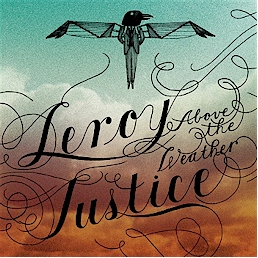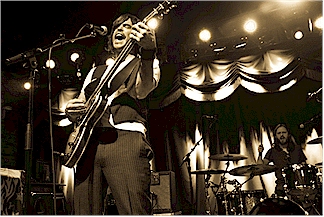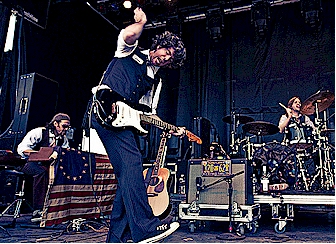 Even though I pretty much shut this column down a while back, my friend/editor/collaborator/occasional thorn-in-side Jeff Giles (y’all) will occasionally try to lure me back to it, quite often with the difficult-to-resist bait of new work from the likes of smooth jazz instrumentalists, or swarthy Greek lover-men, or twangy husband/wife duos, or, you know, liquor. All of these things I find enticing, but not as inspiring as I once might have, and thus, I usually decline to participate. I say no. I can do that now.
Even though I pretty much shut this column down a while back, my friend/editor/collaborator/occasional thorn-in-side Jeff Giles (y’all) will occasionally try to lure me back to it, quite often with the difficult-to-resist bait of new work from the likes of smooth jazz instrumentalists, or swarthy Greek lover-men, or twangy husband/wife duos, or, you know, liquor. All of these things I find enticing, but not as inspiring as I once might have, and thus, I usually decline to participate. I say no. I can do that now.
Except when I can’t—when the offer is irresistible, when the music attached to that offer is inspiring, or interesting, or just plain superb. Recently, Jefito introduced me to the band Leroy Justice—a northern PA/New York quintet that manages to take many of the coolest parts of classic rock radio (the riffs, amphitheater-ready vocals, and songs that are at once universal and deeply personal) and fold them into a modern context. They’ve put out several records in the last few years, and their newest, Above the Weather, is their first with major-label distribution. Damned if it isn’t one of the best things I’ve heard this year.
The first thing you notice about Leroy Justice is singer/main songwriter Jason Gallagher, whose voice is an effective, unholy combo of Shannon Hoon’s timbre and the phrasing of … someone not quite as high as Shannon Hoon. Maybe Ryan Adams. I can’t quite place it. Gallagher can rage to the heavens or lull you into submission, or do both, quite often within seconds, and the band’s songs have the structure and range of dynamics to allow for that kind of thing. Even hearing him play a cover tune (check out his “Peanut Butter Sessions” covers on YouTube for examples) is like hearing old favorites for the first time.
The instrumental nexus of the band consists of drummer Josh Karis, keyboardist Sloan Marshall, bassist Bradley Wegner, and hotshot 22-year-old Justin Mazer on guitar. They’re an exceptionally tight combo, if the new record is any indication, and a monster live band, if the reviews I’ve read are to be believed.
The bread and butter of any band—young or old—is the bank of songs it creates and accumulates, and with the fine stuff on Above the Weather, Leroy Justice appears to be building an impressive oeuvre. “Up on the Mountain” kicks off the record with a Comes a Time-like acoustic beginning that takes off into a blaring Rust Never Sleeps conclusion about three-quarters of the way through. “Worry” bids a troublesome relationship farewell and fuck off, with the guitar and vocal playing a tense high-wire act that ends with a cool Zeppelinish breakdown. “A New Island” is a beautiful ballad about … something (more about that in a moment), and “Before I Die” features a twin-lead-guitar thing in the middle and outro that sounds lifted off one of my cousin Chuck’s eight-tracks in 1976 (and I mean that in the nicest possible way). Above the Weather is a lot of fun—a great soundtrack for your next long drive, or any other summer activity for which cool new music is a necessity.
I exchanged emails with Jason Gallagher recently, to inquire about Leroy Justice, their new record, and the importance of peanut butter to the modern rock ‘n’ roll musician. Here’s how it went.
 Tell me a bit about your band—how long you’ve been making music together, who got together with whom, when, etc.
Tell me a bit about your band—how long you’ve been making music together, who got together with whom, when, etc.
Leroy Justice was formed one night around a poker table on the Lower East Side of New York City. Years later, some members have left, some have joined, and the band is now the five members who recorded this record. Justin was the last member to join the band, about two years ago, and his playing really helped define our sound on Above the Weather.
What does Justin bring to your music?
He’s an incredible player. He’s versatile, creative, and able to add just the right amount of flavor to any song. We really felt we discovered something special when we auditioned him, and I personally feel he will be a big star as a guitarist.
I like the new record a lot. In the press material for it, you mention that you had to explore new ways of writing, arranging, and producing songs, in order to push your limits creatively. What did you do differently on Above the Weather that helped you find and go past those limits?
Thanks! We really grinded out the arrangements for a few of the first songs we wrote. Songs like “Row Boat” and “Worry” were the inspiration to start writing songs in a different way, to really explore new ways to play a verse or chorus. At the same time, there are a few songs that came together quickly, like “Blue-Eyed-Blues,” and we let them just be what they needed to be, straight ahead rock tunes with some great guitar tones. I think we just got better at making interesting music, music we love to play and hopefully that others will love to hear.
 Did these new efforts at writing, arranging, and producing also extend to your performance as a singer? You have a very distinctive voice, and you do a lot with it on this record.
Did these new efforts at writing, arranging, and producing also extend to your performance as a singer? You have a very distinctive voice, and you do a lot with it on this record.
I’ve heard that from a few people recently, and it’s unexpected. Much of the vocal melodies are written as I write the song on an acoustic guitar or as I sing along with the band as we figure out how to play the song. It’s pretty organic, and I do my best to make it fit with the music and just try not to get in the way. I’ll thank my mom for the distinctive sound, I guess! Must be the genes.
You do some very cool things with arrangements in your songs—I’m thinking of the guitar/drum/organ breakdown at the end of “Worry,” and the quiet/loud dynamic shift in “Up on the Mountain.” Do those come out of jams or rehearsals, or do you have things like those in mind from the start, once you’re done writing the song?
The best way for us to arrange a song is to play it. It starts sticking in your head, and before you know it, you’re walking out of the subway one day and, boom, there’s an outro idea for “Worry.” If you live with the songs every day, they just keep getting better. The album is just a record of those songs at this time, and they’ll probably continue to evolve. Josh, our drummer, is a creative force when it comes to arranging as well, and his playing really dictates the way a song can end up.
The extended dual guitar solo in “Before I Die” is a total classic rock move, like Thin Lizzy, or KISS doing “Detroit Rock City.” I smile whenever I hear it. Was the intent to get that kind of classic feel? How did that section come about?
That’s a great example of how Josh can help make a song into something special. He just came in one day with the change to get us into that jam. We had been playing that second half as another song and it just fit. It’s our favorite to play, and it’s quickly becoming a fan favorite as well. Come see us play and you’ll see us smile, too.
 “Before I Die” is eight and a half minutes long, but I can imagine it stretching even longer in a live setting. Is your band the type that will spread out and improvise onstage, or do you hew pretty closely to the way your songs are recorded?
“Before I Die” is eight and a half minutes long, but I can imagine it stretching even longer in a live setting. Is your band the type that will spread out and improvise onstage, or do you hew pretty closely to the way your songs are recorded?
As I said earlier, this is just the beginning. I imagine in a few months these songs will start sprouting new limbs and become new creatures. Bands who change up arrangements and interludes in concert are some of my favorite bands to see play. We try to live up to that standard.
Is there a story behind “A New Island?” It’s my favorite song on the album—the melody is gorgeous, and you’re in great voice on it. The lyrics confound me, though—is it about a loss of faith? Or a son’s relationship with his father? Or none of the above?
Thank you so much! Some of my favorite things I read or hear or watch are things I don’t quite understand the first time through, but somehow connect to them immediately. I can only hope there’s some of that on this record. I kept ”A New Island,” and a few other songs, a little vague so it doesn’t have to mean one thing. Certainly there are themes of loss, leaving something behind, and rising above all over this album, and this song is no different.
“Row Boat” is the perfect ending for the record; the song’s sense of escape and finality (“The last thing we share is today / Don’t come lookin’ for me / I ain’t lost, now I’m free”) is a great conclusion. “Church Bells” seemed to end [your 2007 album] Revolution’s Son with a similar sort of finality (though, if I’m not mistaken, it was from a bar stool, instead of a boat). It makes me wonder what criteria you use when sequencing your records—are you telling a story, or going for a mix in dynamics, or is it just a “feel” thing?
It’s always fun to get to the sequencing of the record. Our manager Moose is credited in the liner notes with ”sequencing” for a good reason. I think he’s our biggest fan, and knows why we are doing what we are doing, and I think he nailed it. I didn’t want to put out an EP, or a series of singles. I wanted to make an album and tell a story. ”Row Boat” is the end of the album, and it’s a conclusion to the story, but it’s the beginning of a new chapter as well.
 You’re getting major-label distribution for Above the Weather. Is that something you’ve wanted previously? How did the deal come about?
You’re getting major-label distribution for Above the Weather. Is that something you’ve wanted previously? How did the deal come about?
Our good friends from the band moe. had a lot to do with helping us partner with Elm City Music and get this record out there. We wanted to finish it right, and make it available everywhere, and that’s what the major-label distribution can do. All I can tell you is there was a guy smoking cigars, a meeting at a diner, and a lot of handshakes, and then we had a deal. It was all very old-school. It felt right.
Explain what “The Peanut Butter Sessions” are all about. You do a really cool version of “The Long and Winding Road,” and you play with the melody—how did you come up with that?
We performed the Beatles’ Let it Be album in its entirety in concert once or twice, and when we were rehearsing it, ”Long and Winding…” was a bit of a downer. It was giving us a hard time, so we decided to turn it into a soul tune. Sometimes I’ll record myself playing a song or two to clue in our fans how we’re going to play it live, and that’s where the PB Sessions came from. I just wanted to make it a little weird, so I added peanut butter. Try it, it works on almost anything!
Is there anything else you’d like people to know about Leroy Justice?
You have to see us live. If you haven’t, you just don’t know Leroy.





Comments